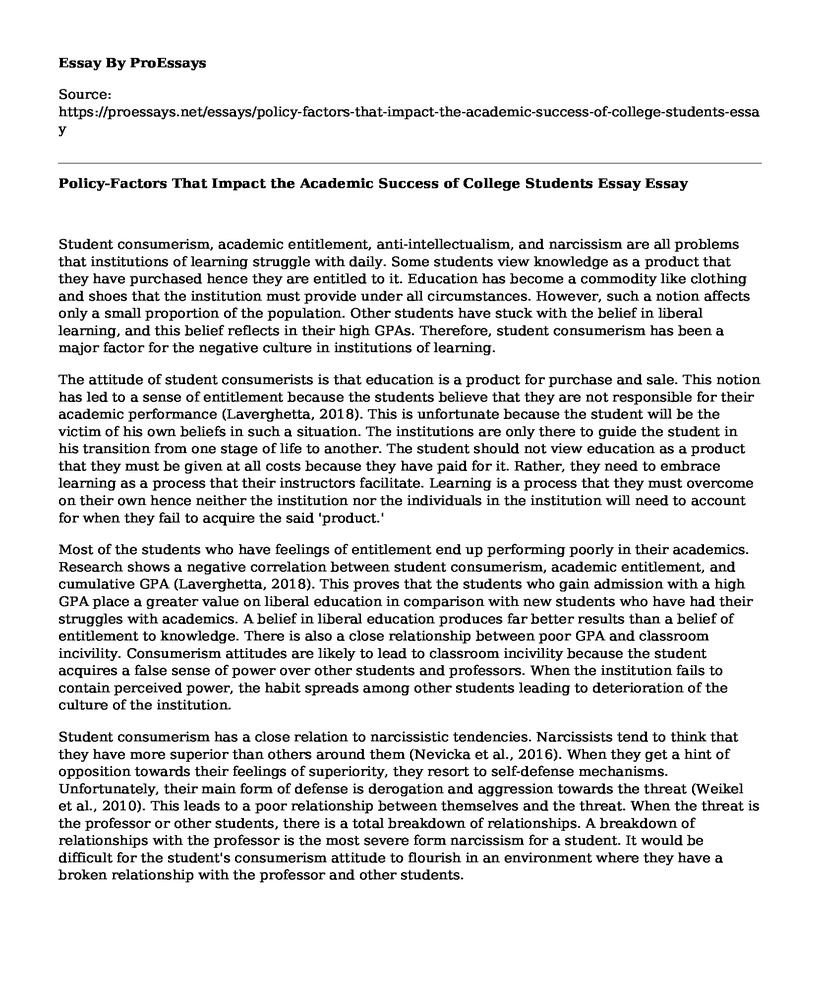Student consumerism, academic entitlement, anti-intellectualism, and narcissism are all problems that institutions of learning struggle with daily. Some students view knowledge as a product that they have purchased hence they are entitled to it. Education has become a commodity like clothing and shoes that the institution must provide under all circumstances. However, such a notion affects only a small proportion of the population. Other students have stuck with the belief in liberal learning, and this belief reflects in their high GPAs. Therefore, student consumerism has been a major factor for the negative culture in institutions of learning.
The attitude of student consumerists is that education is a product for purchase and sale. This notion has led to a sense of entitlement because the students believe that they are not responsible for their academic performance (Laverghetta, 2018). This is unfortunate because the student will be the victim of his own beliefs in such a situation. The institutions are only there to guide the student in his transition from one stage of life to another. The student should not view education as a product that they must be given at all costs because they have paid for it. Rather, they need to embrace learning as a process that their instructors facilitate. Learning is a process that they must overcome on their own hence neither the institution nor the individuals in the institution will need to account for when they fail to acquire the said 'product.'
Most of the students who have feelings of entitlement end up performing poorly in their academics. Research shows a negative correlation between student consumerism, academic entitlement, and cumulative GPA (Laverghetta, 2018). This proves that the students who gain admission with a high GPA place a greater value on liberal education in comparison with new students who have had their struggles with academics. A belief in liberal education produces far better results than a belief of entitlement to knowledge. There is also a close relationship between poor GPA and classroom incivility. Consumerism attitudes are likely to lead to classroom incivility because the student acquires a false sense of power over other students and professors. When the institution fails to contain perceived power, the habit spreads among other students leading to deterioration of the culture of the institution.
Student consumerism has a close relation to narcissistic tendencies. Narcissists tend to think that they have more superior than others around them (Nevicka et al., 2016). When they get a hint of opposition towards their feelings of superiority, they resort to self-defense mechanisms. Unfortunately, their main form of defense is derogation and aggression towards the threat (Weikel et al., 2010). This leads to a poor relationship between themselves and the threat. When the threat is the professor or other students, there is a total breakdown of relationships. A breakdown of relationships with the professor is the most severe form narcissism for a student. It would be difficult for the student's consumerism attitude to flourish in an environment where they have a broken relationship with the professor and other students.
Conclusion
Overall, it is evident that student consumerism has severely affected the culture of schools. Education requires the consumer commits to acquire all the benefits of the service (Ng and Forbes, 2009). When the students view education as a product that they have purchased, they become victims of their own beliefs. Narcissistic students are usually the main culprits in spreading this belief because they believe they are superior hence entitled to everything. The students who believe in liberal learning benefit the most while the peers lag.
References
Laverghetta, A. (2018). The Relationship between Student Anti-intellectualism, Academic Entitlement, Student Consumerism, and Classroom Incivility in a Sample of College Students. College Student Journal, 52(2), 278-282.
Nevicka, B., Baas, M., & Ten Velden, F. S. (2016). The bright side of threatened narcissism: Improved performance following ego threat. Journal of personality, 84(6), 809-823.Ng, I. C., & Forbes, J. (2009). Education as service: The understanding of university experience through the service logic. Journal of Marketing for Higher Education, 19(1), 38-64.
Weikel, K. A., Avara, R. M., Hanson, C. A., & Kater, H. (2010). College adjustment difficulties and the overt and covert forms of narcissism. Journal of College Counseling, 13(2), 100-110.
Cite this page
Policy-Factors That Impact the Academic Success of College Students Essay. (2022, Nov 09). Retrieved from https://proessays.net/essays/policy-factors-that-impact-the-academic-success-of-college-students-essay
If you are the original author of this essay and no longer wish to have it published on the ProEssays website, please click below to request its removal:
- Policy Development: Regulating the Use of Social Media in Law Enforcement Organizations
- Macroeconomic Policy Lessons From the Financial Crisis Paper Example
- Essay Sample on Classroom Multi-Sensory Corner Intervention
- Essay Sample on Gaining Confidence in Teaching the Deaf and Hard Hearing
- Research Paper on Tax Cuts and Jobs Act: Who Benefits the Most?
- Essay on Problem-solving & Crime Prevention: Community Policing for Creative Solutions
- George W. Bush Supports United Nations Peacekeeping Efforts in East Timor - Essay Sample







